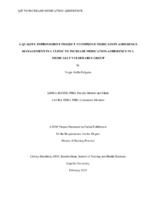A quality improvement project to improve medication adherence management in a clinic to increase medication adherence in a medically vulnerable group
View File(s)
- Author(s)
- Details
-
Virgie Stella Delgado, DNP, MSN Ed., BSN, RN, PHN, DSD, Adjunct Faculty/Lecturer-Community Health, vdelgado@csusm.edu
- Sigma Affiliation
- Omega Gamma
- Contributor Affiliation(s)
- California State University San Marcos, San Marcos, California, USA
Visitor Statistics
Visits vs Downloads
Visitors - World Map
Top Visiting Countries
| Country | Visits |
|---|
Top Visiting Cities
| City | Visits |
|---|
Visits (last 6 months)
Downloads (last 6 months)
Popular Works for Delgado, Virgie Stella by View
| Title | Page Views |
|---|
Popular Works for Delgado, Virgie Stella by Download
| Title | Downloads |
|---|
View Citations
Citations
This Quality Improvement Project (QIP) assessed the effect of a multi-component evidence-based (EB) Medication Adherence Intervention on adherence at a nurse-managed, student-run free clinic treating medically vulnerable adults aged >18 years who lacked health insurance and financial resources, had language barriers, low academic, health literacy, and understanding levels. The clinic staff lacked a process for screening, managing, and documenting non-adherence, estimated to be >50% by the stakeholders. Vulnerable patients, at risk for health disparities, known to need added time and attention (Viswanathan et al., 2012) did not receive adherence aid. Johnson’s (2002) Medication Adherence Model (MAM) describes the process patients go through to adhere, e.g., purposeful action, pattern behavior, and feedback. MAM’s concepts helped design, guide, and infer the intervention effects on adherence. The intervention involved: a) a designed online educational module to train staff on adherence and the QIP, b) a change to the clinic’s care process, and c) two 1-hr case management (CM) patient educational sessions, 4-weeks apart, on disease, medications, self-management, provider communication, and adhering-aiding tools. Adherence rates improved by 141% and blood pressure (B/P) and blood sugar finger sticks (BSFS) levels decreased in two months.
This work has been approved through a peer-review process prior to its posting in the Virginia Henderson Global Nursing e-Repository.
| Type | DNP Capstone Project |
| Acquisition | Self-submission |
| Review Type | None: Degree-based Submission |
| Format | Text-based Document |
| Evidence Level | Quality Improvement |
| Research Approach | Quantitative Research |
| Keywords | Free Clinic; Vulnerable Patients; Medication Adherence; Self-management; Literacy; Medication Non-adherence; Medication Education; Multi-component Adherence Intervention |
| CINAHL Subject(s) | Nurse-Managed Centers; Health Services Accessibility; Special Populations; Medication Compliance; Self Care; Drug Therapy--Education; Nursing Interventions |
| Grantor | Capella University |
| Advisor | Royer, Linda |
| Level | DNP |
| Year | 2019 |
All rights reserved by the author(s) and/or publisher(s) listed in this item record unless relinquished in whole or part by a rights notation or a Creative Commons License present in this item record.
All permission requests should be directed accordingly and not to the Sigma Repository.
All submitting authors or publishers have affirmed that when using material in their work where they do not own copyright, they have obtained permission of the copyright holder prior to submission and the rights holder has been acknowledged as necessary.
License
The following license files are associated with this item:
Related items
Showing items related by title, author, creator and subjects.
-
Improving medication adherence in psychiatric patients with a medication adherence program
Peterson, WhitneyIntroduction: Medication non-adherence significantly impacts patients with serious mental illness (SMI). It’s estimated that over 50% of patients prescribed antipsychotic medication are non-adherent to the prescribed ... -
The effectiveness of an interactive theatre intervention on improving adherence to self-management regimens for breast cancer-related lymphedema
Ostby, Pamela L. (2016-10-11)Purpose: The purpose of this study was to determine the effectiveness of an interactive theatre (IT) intervention bundled with printed information to printed information alone in improving adherence to self-management of ... -
Evidence-based educational in home program to improve self-management adherence and A1C levels for patients with diabetes
Blaker, GarrettBackground: Diabetes diagnosis rates continue to grow, affecting many patients, communities, and health care organizations. One of the greatest challenges faced by patients with diabetes is maintaining diabetes self-management ... -
A review of the patterns, predictors, and interventions to improve adherence
Neiheisel, Mary (2014-11-17)Session presented on Saturday, July 26, 2014: Purpose: This is the first of a three part series on Medication Adherence in which the authors describe the continuum of adherence to non-adherence of medication usage. Methods: ... -
Developing and validating a tool to improve self-management of antineoplastic therapy at home
Bagnasco, Annamaria (2017-07-27)This study shows how to develop and validate a patient education tool to improve adherence to treatment and improve safety by reducing errors, especially in a vulnerable population such as cancer patients. A small group ...






